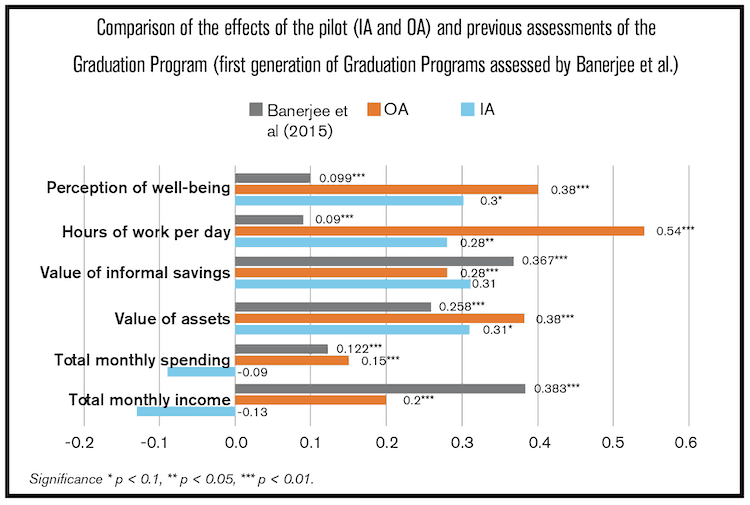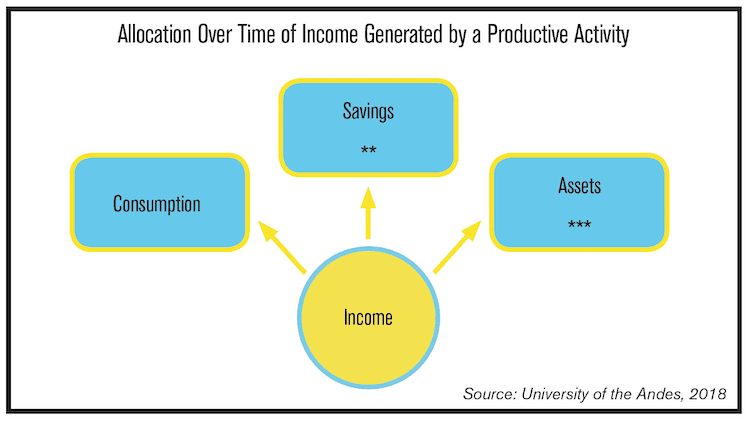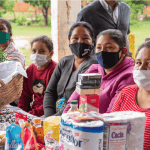Is Government the Key to Scaling up Graduation Programs? Results From an Impact Evaluation in Latin America
In social philanthropy, the term graduation refers to programs focused on increasing and improving the productive, financial, human and social assets of people living in extreme poverty. Graduation programs offer participants the tools and resources they need to identify and create a viable livelihood, weather crises and continue on the path to development on their own terms.
Initial trials of graduation programs were NGO-led, and financed exclusively by international donors. But while these initiatives were effective, they proved to be costly to bring to scale. And though government collaboration presented a logical solution to that challenge, it also raised some additional challenges of its own.
For instance, government involvement inevitably risks negatively affecting graduation programs with public standards, which set limits on the types of investment the programs can use, and add annual budget restrictions and other constraints. In Fundación Capital’s experience working on graduation programs since 2011, we’ve heard concerns from the development community who wondered if government restrictions would affect the quality of these projects’ execution.
The University of the Andes conducted a recent study of our graduation initiatives, aiming to find out if the graduation approach can be rolled out by governments without compromising its impact. The results, summarized below, make us optimistic that government involvement holds the answer to successfully and cost-effectively scaling graduation approaches to poverty-reduction.
Studying the Effects of Government-Run Graduation Programs
In 2013, we rolled out a regional graduation initiative in collaboration with various governments, with support from the Ford Foundation and IDRC Canada. These efforts, which took place in Colombia, Honduras, Mexico and Paraguay, were formally evaluated by the University of the Andes in Colombia, through an evaluation platform funded by the initiative’s partners.
Our graduation program in Paraguay, implemented as an 18-month pilot for 850 families as part of the government’s National Financial Inclusion Strategy, underwent both outcomes assessment (OA) and impact assessment (IA). The latter assessment is of particular importance, as it isolates the real effects of the program on participants, and all changes identified by the assessment can be directly attributed to the program. The recently-published impact assessment shares remarkable evidence of the effects of graduation-type programs in Latin America. Some of the highlights include the following benefits experienced by program participants. Note: The statistical significance of the results is indicated by the number of asterisks (*) next to the values – more asterisks mean greater statistical significance:
- A 24% (IA) annual increase and an 84% (OA) daily increase in number of hours worked
- A 27% (IA) and a 52% (OA) increase in assets – equivalent to US $633.63* (IA) and US $760.30*** (OA)
- An increase in monthly income of US $21.35** (IA) and US $19.75*** (OA)
- A 10.31%** (IA) increase in savings
- A 0.28* (IA) and 0.42*** (OA) increase in expectations (defined as a person’s ability to set goals and come up with ways to achieve them) and a 0.23*** (RA) increase in levels of happiness
For more details on the Paraguay case learnings, click here.
Conclusions from Our Graduation Program Research
Among the most encouraging findings from this research was the fact that the government-run graduation program had very similar effects to previous graduation programs, which are non-governmental and thus carried out in more controlled environments. This is significant: It proves that it is possible to maintain high standards in project execution while working with governments.

The results bear more weight when we consider their statistical significance: The results with more asterisks are more likely to recur in other programs conducted under similar conditions.
Furthermore, analysis of the Paraguayan initiative revealed a shift in mentality towards medium- and long-term planning among participants. Families living in extreme poverty usually think short-term, focusing on how to survive one day at a time. Through the graduation program, families not only began to dream again, but also changed their mindset, decision-making and financial decisions to reflect a focus on sustainability. Consumption behaviors either remained constant or reduced – participants saved more, but above all, they reinvested more.

This is key – it shows that graduation programs tackle one of the main structural causes of poverty. Participants are making investment decisions that positively and sustainably affect the wellbeing of their families.
At Fundación Capital we have always believed in giving participants the right to make their own decisions. We have to trust that they know what is best for themselves, and that they spend their money based on those priorities. The results tend to speak for themselves. For instance, in Paraguay, each graduation participant received US $500 in seed money to start a business: Six months after the end of the program, their businesses were worth US $633 (IA) and US $760 (OA). “I made my dream come true: Now I have a workshop and a [sewing] machine, and I am starting to make clothes,” says Mirna Medina, a program participant from Capiibary, Paraguay who shaped her own future in the framework of the government program.
Collaborating for Scale – In Paraguay and Beyond
According to the latest national census, there are approximately 335,000 families living in extreme poverty in Paraguay. The positive assessments of our graduation program there were pivotal in allowing us to approach the new government in Paraguay to ensure the expansion of the pilot program to a national level. We are partnering with Co-Impact on a collaboration with the Presidency of the Republic and the Ministry of Social Development to reach at least 75,000 of these families. We are all committed to scaling the graduation program, not only to help more families build sustainable livelihoods, but also to trigger national systemic change.
Looking to expand on this impact, we aim to implement comparable sustainable changes in other countries – including Mexico, Honduras and Colombia – where the graduation programs implemented with the respective governments are revealing similar results to those seen in Paraguay. As one of the first impact assessments of government-led graduation programs worldwide, these results will advance those efforts by providing ground-breaking evidence that the graduation approach is truly scalable and cost-effective.
Tatiana Rincón is Vice President of Social and Livelihood Promotion and Adriana Insaurralde is Resident Representative for the Southern Cone of South America at Fundación Capital.
Photo courtesy of Fundación Capital.
- Categories
- Impact Assessment



